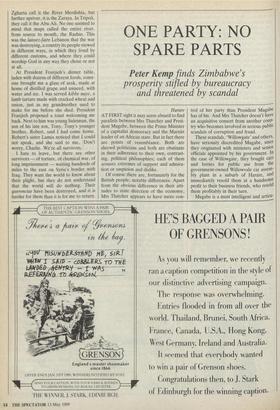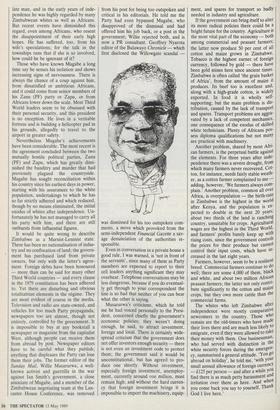ONE PARTY: NO SPARE PARTS
Peter Kemp finds Zimbabwe's
prosperity stifled by bureaucracy and threatened by scandal
Harare AT FIRST sight it may seem absurd to find parallels between Mrs Thatcher and Presi- dent Mugabe, between the Prime Minister of a capitalist democracy and the Marxist leader of an African state. But in fact there are points of resemblance. Both are shrewd politicians and both are obstinate in their adherence to their own, contrast- ing, political philosophies; each of them arouses extremes of support and admira- tion or suspicion and dislike.
Of course there are, fortunately for the British people, notable differences. Apart from the obvious difference in their atti- tudes to state direction of the economy, Mrs Thatcher appears to have more con- trol of her party than President Mugabe has of his. And Mrs Thatcher doesn't have an acquisitive consort from another coun- try who becomes involved in serious public scandals of corruption and fraud. These scandals, Willowgate' and others, have seriously discredited Mugabe, since they originated with ministers and senior officials appointed by his government. In the case of Willowgate, they bought cars and lorries for public use from the government-owned Willowvale car assem- bly plant in a suburb of Harare, and immediately resold them at a handsome profit to their business friends, who resold them profitably in their turn.
Mugabe is a most intelligent and articu-
late man, and in the early years of inde- pendence he was highly regarded by many Zimbabwean whites as well as Africans. But recent events have diminished this regard, even among Africans, who resent the disappointment of their early high hopes. He has suffered, too, from his wife's speculations; for the talk in the townships runs that if she is so involved, how could he be ignorant of it?
Those who have known Mugabe a long time say he senses his isolation and shows increasing signs of nervousness. There is always the chance of a coup against him, from dissatisfied or ambitious Africans, and it could come from senior members of his Zanu (PF) party or Zapu, or from Africans lower down the scale. Most Third World leaders seem to be obsessed with their personal security, and this president is no exception. He lives in a veritable fortress and is building a helicopter pad in his grounds, allegedly to travel to the airport in greater safety.
Nevertheless Mugabe's achievements have been considerable. The most recent is the agreement concluded between the two mutually hostile political parties, Zanu (PF) and Zapu, which has greatly dimi- nished the banditry and murder that had previously plagued the countryside. Mugabe has sought reconciliation within his country since his earliest days in power, starting with his assurances to the white population, undertakings to which he has so far strictly adhered and which reduced, though by no means eliminated, the initial exodus of whites after independence. Un- fortunately he has not managed to carry all his party with him, and there are still outbursts from influential figures.
It would be quite wrong to describe Zimbabwe as a Marxist-Leninist state. There has been no nationalisation of indus- try and no confiscation of land; the govern- ment has purchased land from private owners, but only with the latter's agree- ment. Foreign debts have been honoured — more than can be said for many other Third World countries — and every clause in the 1979 constitution has been adhered to. Yet there are disturbing and obvious totalitatrian elements in the regime. They are most evident of course in the media. Television and radio are state-owned, and vehicles for too much Party propaganda; newspapers too are almost, though not entirely, controlled by the government. It is impossible to buy at any bookstall a newspaper or magazine from the capitalist West, although people can receive them from abroad by post. Newspaper editors have to be careful what they publish; anything that displeases the Party can lose them their jobs. The former editor of the Sunday Mail, Willie Musarurwa, a well- known activist and guerrilla in the war against Ian Smith's government, a close associate of Mugabe, and a member of the Zimbabwean negotiating team at the Lan- caster House Conference, was removed from his post for being too outspoken and critical in his editorials. He told me the Party had even bypassed Mugabe, who disapproved of the dismissal and had offered him his job back, or a post in the government; Willie rejected both, and is now a PR consultant. Geoffrey Nyarota editor of the Bulawayo Chronicle — which first disclosed the Willowgate scandal — was dismissed for his too outspoken com- ments, a move which provoked from the semi-independent Financial Gazette a sav- age denunciation of the authorities re- sponsible.
Even in conversation in a private house a good rule, I was warned, is 'not in front of the servants', since many of them as Party members are expected to report to their cell leaders anything significant they may overhear. Telephone conversations may be less dangerous, because if you do eventual- ly get through to your correspondent the line is so bad that neither of you can hear what the other is saying.
Musarurwa's criticisms, which he told me he had voiced personally to the Presi- dent, concerned chiefly the government's economic policies; they weren't doing enough, he said, to attract investment, foreign and local. There is certainly wide- spread criticism that the government does not offer investors enough security — there is not even an investment code to protect them; the government said it would be unconstitutional, but has agreed to pro- duce one shortly. Without investment, especially foreign investment, unemploy- ment, currently around one million, must remain high; and without the hard curren- cy that foreign investment brings it is impossible to import the machinery, equip-
ment, and spares for transport so badly needed in industry and agriculture.
If the government can bring itself to alter its more radical policies there could be a bright future for the country. Agriculture is the most vital part of the economy — both among commercial and peasant farmers; the latter now produce 50 per cent of all cotton and maize grown in Zimbabwe. Tobacco is the highest earner. of foreign currency, followed by gold — there have been gold mines here since ancient times. Zimbabwe is often called 'the grain basket of Africa', from the amount of maize it produces. Its beef too is excellent and, along with a high-grade cotton, is widely exported. In food it is wholly self- supporting; but the main problem is dis- tribution, caused by the lack of transport and spares. Transport problems are aggra- vated by a lack of competent mechanics, one consequence of the exodus of skilled white technicians. Plenty of Africans pos- sess diploma qualifications but not many are practical with machinery. Another problem, shared by most Afri- can farmers, is the perpetual battle against the elements. For three years after inde- pendence there was a severe drought, from which many farmers never recovered. Cot- ton, for instance, needs fairly stable weath- er, as a cotton farmer complained to me — adding, however, 'We farmers always com- plain.' Another problem, common all over Africa, is overpopulation — the birth-rate in Zimbabwe is the highest in the world after Kenya, and the population is ex- pected to double in the next 20 years; about two thirds of the land is ranching country, unsuitable for crops. Agricultural wages are the highest in the Third World, and farmers' profits barely keep up with rising costs, since the government controls the prices for their produce but cannot control their input costs, which have in- creased in the last eight years. Farmers, however, seem to be a resilient breed. Commercial farmers continue to do well; there are some 4,000 of them, black and white, and about two million African peasant farmers; the latter not only contri- bute significantly to the cotton and maize crops, but they own more cattle than the commercial farms.
The whites who left Zimbabwe after independence were mostly comparative newcomers to the country. Those who remain are the old-timers who have made their lives there and are much less likely to emigrate, even if they were allowed to take their money with them. One businessman, who had served with distinction in the white security forces during the emergen- cy, summarised a general attitude. 'You go abroad on holiday', he told me, 'with your small annual allowance of foreign currency £125 per person — and after a while you find there is as much petty harassment and irritation over there as here. And when you come back you say to yourself, Than God I live here.'



























































 Previous page
Previous page